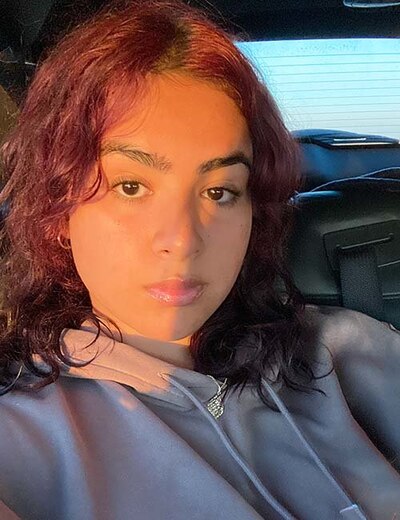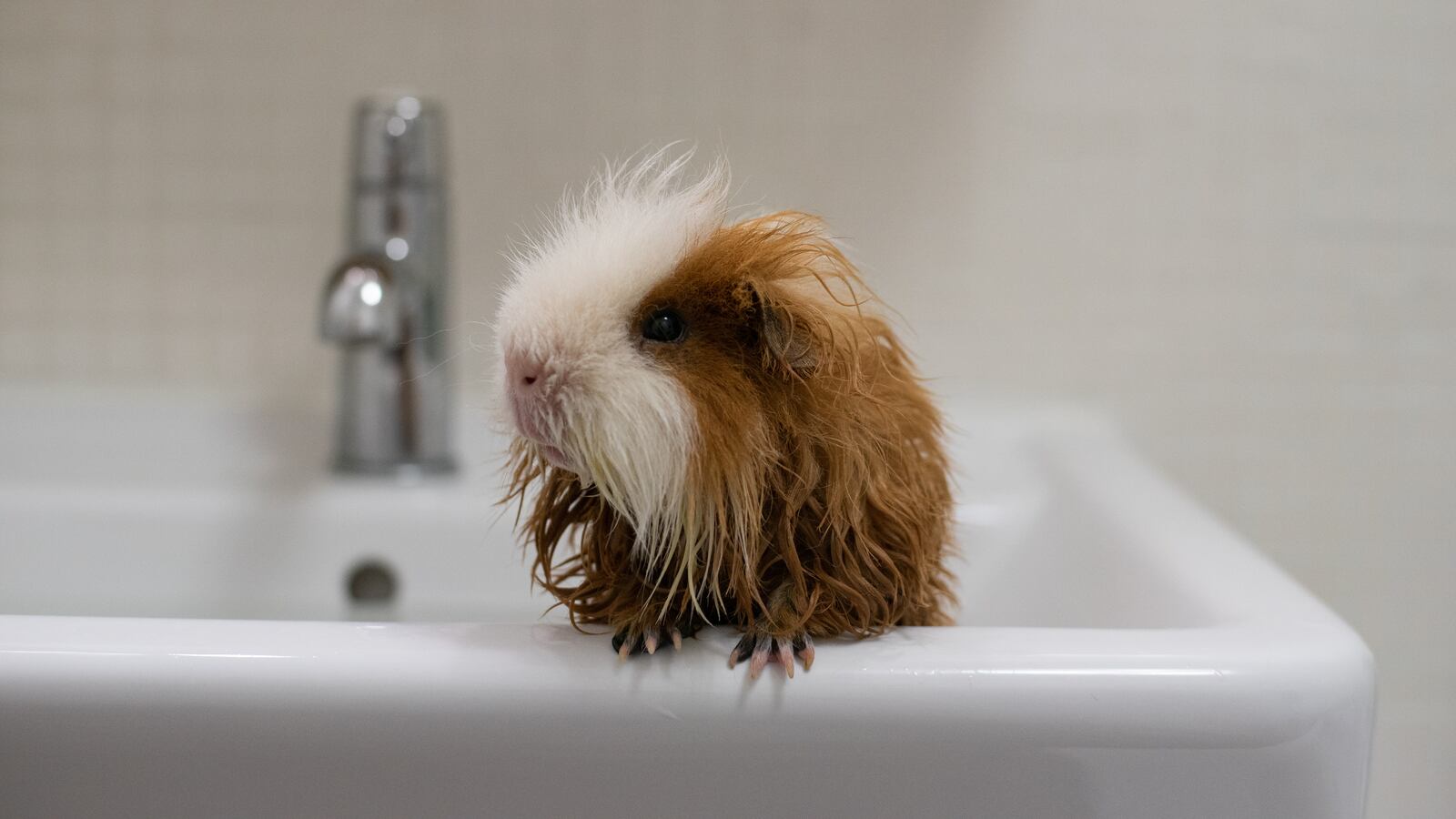When I started middle school, there were a lot of things I didn’t like. I didn’t like the teachers. I didn’t like the building. Honestly, I didn’t even like the girl I saw in the mirror. She was quiet, self-conscious, and afraid of not fitting in.
But I loved our class pets. There were snakes, a rabbit, a hedgehog, a tortoise, and a bearded dragon; we even had hissing Madagascar cockroaches. One day in seventh grade, our science teacher, Mr. Franks, introduced us to a new pet, a guinea pig. She was donated by a student who couldn’t take care of her anymore.
“The new guinea pig,” as everyone called her, was skinny, five months old, and had beautiful, long, brown fur with one, singular hair that stuck up straight. We bonded right away. I’ve always wanted a pet of my own but my apartment building doesn’t allow pets. I was happy to give her the love she deserved.

At first, when I petted her, she flinched away from me. I tried again, and she started cooing. She was shy, like I was, and had to get used to people. I made a list of names for her and landed on Hershey, for her brown fur.
Then, I learned that the student who gave her away had already named her Bebe, after the clothing brand. I thought that since I was the one taking care of her now, I should get to give her a new, more fitting name. After all, I was the one cleaning her cage. I was the one who gave her her first bath in the girls’ bathroom sink. I had scratches all over me, but I was happy to see Hershey so clean. I was the one who used my allowance money to buy her fresh vegetables and fruits.
Her favorite fruit was raspberries. The first time I gave her one, I heard a new coo, like cat’s purr. Soon, Hershey wasn’t so skinny anymore.
Although Mr. Franks never officially renamed her Hershey, over time, everyone began calling her that, and she became the pet I wasn’t able to have at home.
I filled my diary with entries about her progress. She loved her cage and scurrying into the pink castle inside. She was becoming more social and enjoyed being carried around upright, her stomach on mine. When she needed more food or her nails clipped, I spoke up on her behalf to Mr. Franks.
Once, my algebra teacher said that Hershey looked like a dirty street rat. If someone had said something like that to me, I would’ve probably ignored them. But I clapped back on Hershey’s behalf. Speaking up for Hershey made me more comfortable speaking up for myself.
Meanwhile, because I had Hershey’s company to look forward to every day, I was more motivated at school. I knew that if my grades slipped or if I came to school late too many times, I’d lose the privilege of taking care of Hershey. I even spent more time with my friends and began to make new ones. Even though I still didn’t like the teachers or how small and gloomy the building was, I began to realize that I wouldn’t be stuck in middle school forever. As long as I focused on myself and Hershey, I would be OK.
Then, spring break rolled around and someone needed to take Hershey home with them. I thought my mom would say no, but I begged and pleaded for a whole week until, finally, she said, “This will be the only time, Israa. You know the rules.” I nodded and emailed Mr. Franks.
When I brought Hershey home, I covered her until we entered my apartment, then I took her out of her cage. She cooed happily in my arms, cocking her head from side to side, as I asked my mom, “Mama, do you want to hold her?” Before my mom could respond, I put Hershey in her hands. Hershey didn’t fuss or coo in discomfort like she usually does when someone new holds her.
From then on, when my mom got home from work, she said hello to Hershey before anyone else in the house. My mom loved Hershey so much that we brought her back during long weekends and school breaks. Even when I graduated middle school, I begged my younger brother to ask Mr. Franks if he could bring Hershey back to our house, and he did.
When the COVID-19 pandemic happened, I was a high school freshman, and my brother was in seventh grade. My first thought was of Hershey. It turned out that the school had found families to take all the pets before my brother got the chance to ask for Hershey. So, we didn’t have her during quarantine, even though she was what I needed most during that lonely time. I tried to stop myself from thinking that Hershey was feeling the same loneliness that I was.
I filled my diary with entries about her progress. She loved her cage and scurrying into the pink castle inside.
My dad was extremely afraid of COVID-19 early in the pandemic. I was allowed outside infrequently, to minimize my chances of getting sick. I felt trapped in my home. My skin was dry and pale and, besides school work, I was running out of ways to keep myself occupied.
Near the end of the school year, I received good news. Hershey needed someone to take care of her for the summer. I wrote to Mr. Franks asking if we could take her. Suddenly, I was in my dad’s Suburban with Hershey. As I sat in the passenger seat listening to her coo, I was so happy that I almost asked my dad if I could sit with her in the hatchback trunk.
When I got home, I realized that Hershey was doing worse than I was. Her hair was shedding and she had low energy, which can indicate depression in guinea pigs. She was dirty, almost as skinny as she was the first time I met her, and her nails were so overgrown that they curled back into her skin.
Right away, I cleaned her cage, cleaned her, clipped her nails, and brushed her hair. She didn’t resist any of it. In the past, Hershey had hated the feeling of water on her and would never let me touch her feet. But now, it was like she knew she needed the help. I fed her fresh vegetables. Who knows how long it had been since she’d had raspberries? “It’s OK, Hershey, you are home now,” I whispered.
After just a couple of hours, Hershey looked so much better that she convinced me to give myself the same care. I began cooking healthy foods for myself instead of the pasta and pizza I had been eating. Even though I wasn’t going anywhere, I did my hair and dressed like I was going to school. I didn’t feel better in just a couple of hours, but, over time, I began to feel like myself again.
After her self-care day, Hershey scurried back into her pink castle, like always, but now, her butt stuck out of the entrance.
My Hershey was growing up. Of course, her pink castle was too small. She’d had it since she was 5 months old and now she was almost 2! I got her a new, bigger castle, white and translucent, but she refused to go inside. She sat outside the entrance of the castle and stared at it. I tried putting them both in her cage at the same time, then taking the pink one out, but she wouldn’t budge.
I didn’t blame her. Hershey struggled with change, like many of us do. She would rather have her butt stick out of her familiar castle than have the proper space she needed in a new one.
Similarly, I knew that I had a lot to say and wanted to be heard, but I’d become comfortable hiding in my own little, pink castle that I had grown too big to fit into.
Over the past two years, I’ve joined organizations such as Yvote, where New York City youth come together to promote collective, civic action. I’ve also decided to pursue a career in journalism, where I can fill pages far beyond my diary with entries about the progress of the world around me, and where I can speak up for myself and others.
I haven’t seen Hershey since the summer of 2020, when my brother graduated from middle school. I want to tell her, “I miss you, Hershey, and I’ll always be grateful to you. Thank you for reflecting back parts of me and teaching me to treat myself with compassion and patience. Thank you for helping me grow out of my pink castle and into the person I want to be in the world.” Now, when I look in the mirror, I see a strong and outspoken young woman.
Israa Belbaita is a rising senior at NYC iSchool. Israa moved from Morocco at a young age and now resides in Queens. Her dream is to be a journalist … or, maybe, a lawyer.
A version of this piece was originally published by Youth Communication. It is reprinted here with permission.


